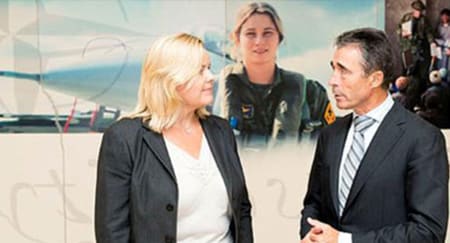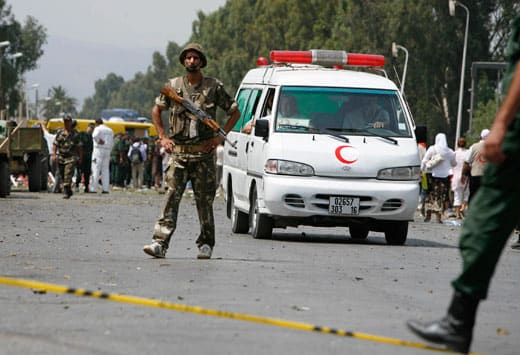NATO has a well established partnership programme with several North African countries bordering the Sahel region of Africa. But as the region witnesses more high profile instability, could NATO play more of a role asks Paul Pryce?
From start to end, 2012 saw the security situation in Libya and the Sahel develop rapidly. Some of these developments were decidedly positive, such as the peaceful transfer of power from the National Transitional Council to Libya’s elected National Congress in August. Yet there have been numerous other developments in the region that have been far less positive and which might soon demand greater attention from NATO member states.
While Operation Unified Protector was instrumental in removing the oppressive regime of Muammar Qaddafi from power, the lack of a concerted international response on the ground in Libya left the country’s considerable arms stockpiles largely unguarded. Thus, the aftermath of the Libyan civil war has seen the proliferation of sophisticated military equipment and experienced fighters across the region, bolstering Tuareg rebel movements and Islamic fundamentalist groups in areas of Mali, Burkina Faso, Niger, and elsewhere. The result has been growing instability across the Sahel region.
This fallout has been particularly detrimental in Mali. By May 2012, just a short few months after the conclusion of Unified Protector, a coalition of Tuareg rebels and Islamist groups loosely associated with al-Qaeda in the Islamic Maghreb (AQIM) proclaimed the independence of the “Islamic Republic of Azawad”, encompassing vast swathes of territory in northern Mali. Fierce fighting soon followed, causing an estimated 65,000 Malians to seek refuge and relative safety in neighbouring Burkina Faso.
Confronted with an emerging crisis in the Sahel, the international community has taken some steps to address the growing instability. In October, the United Nations Security Council adopted Resolution 2071, calling on the African Union (AU) and the Economic Community of West African States (ECOWAS) to develop an actionable plan for an intervention that would assist the lawful Malian government in exerting its sovereignty over all those territories internationally recognized as Malian. On December 20th, having received a rough outline from ECOWAS, the Security Council adopted Resolution 2085, authorizing the AU and ECOWAS to move forward with their plan and calling for Tuareg rebel groups to sever ties with AQIM and its affiliates. As of January 2013, France has begun to provide military support to the Malian government, moving against insurgents in the northern regions of the country.
Resolution 2085 is only the beginning of a long effort that will require a steadfast commitment from all stakeholders to see a peaceful and prosperous Sahel in 2013 and beyond. Central to these efforts must be the High Representative of the AU for Mali and the Sahel, as well as the yet to be appointed counterpart from ECOWAS. The work of these mediators holds the potential to address the deeper causes of conflict in the region, going beyond the simple deployment of military forces by the AU, ECOWAS, or France to counter the encroachment of AQIM. It is in this role of ‘deep’ conflict resolution that NATO could make an immensely valuable contribution, utilizing mediation to prevent al-Qaeda from establishing a lasting foothold in the region while averting a protracted military conflict, at the same time expending minimal Alliance resources.

NATO Secretary General, Anders Fogh Rasmussen together with Mari Skåre, Secretary General's Special Representative for Women, Peace and Security.
© NATO
In August 2012, Secretary General Anders Fogh Rasmussen appointed a new NATO Special Representative for Women, Peace, and Security. Both Jaap de Hoop Scheffer and Anders Fogh Rasmussen have appointed individuals to the office of Special Representative for the Caucasus and Central Asia during their respective tenures as NATO Secretary General. Much as these NATO Special Representatives can, and have, contributed meaningfully toward regional security cooperation, a NATO Special Representative for the Sahel could assist in mediation efforts in Mali, either spearheading discussions between the various factions or serving as backup to the mediators appointed by the AU and ECOWAS. As NATO member states express increasing concern over the potential for arms trafficking within the region, a NATO Special Representative for the Sahel could also prove to be an invaluable contact point between NATO, relevant African regional organisations, and Sahel countries themselves on counter-trafficking efforts.
In carrying out Operation Unified Protector in 2011, NATO has demonstrated both the willingness and the ability to intervene in conflicts taking place on the African continent. As such, the Alliance will soon be expected by many partners in the international community to weigh in on the situation in the Sahel. However, the military intervention pursued by ECOWAS and France risks exacerbating the conflict further, enkindling ethnic tensions while failing to build any confidence among northern communities in the central government of Mali. NATO would demonstrate a greater understanding of the conflict and improve its capacity to address other emerging security issues in the region through the appointment of a Special Representative for the Sahel by the Secretary General.
Indeed, if NATO is to positively influence events in the Sahel, the Alliance must act quickly. The shocking and tragic attack by an al-Qaeda affiliated group on an Algerian gas facility near In Aménas demonstrates the potential for regional conflicts to deepen and spread beyond Mali’s territory. As of this writing, the death toll is estimated to be at least 80. Mokhtar Belmokhtar, the leader of the group responsible, has promised further such attacks. A disjointed response, consisting of unilateral actions by individual states, will only see the situation continue to deteriorate. A concerted response by an international actor like NATO, possessing the diplomatic weight of 28 countries and the expertise of a Special Representative, could avert further violence and bloodshed.
Entering 2013, one of the most pressing questions facing NATO is whether the Alliance can coordinate effectively with other security actors to secure shared interests. At the same time, one of the most pressing moral challenges the Alliance will be confronted with in the coming year is whether NATO can render tangible assistance to one of the most impoverished and imperilled regions of the world. The awful events near In Aménas indicate what is now at stake.
The opinions in this article are those of the author alone and do not necessarily reflect those of the NATO Alliance or of any of its member states.




